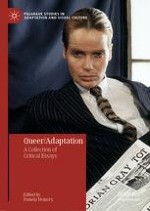2019 | OriginalPaper | Buchkapitel
10. Transnational Slash: Korean Drama Formats, Boys’ Love Fanfic, and the Place of Queerness in East Asian Media Flows
verfasst von : John Lessard
Erschienen in: Queer/Adaptation
Verlag: Springer International Publishing
Aktivieren Sie unsere intelligente Suche, um passende Fachinhalte oder Patente zu finden.
Wählen Sie Textabschnitte aus um mit Künstlicher Intelligenz passenden Patente zu finden. powered by
Markieren Sie Textabschnitte, um KI-gestützt weitere passende Inhalte zu finden. powered by
